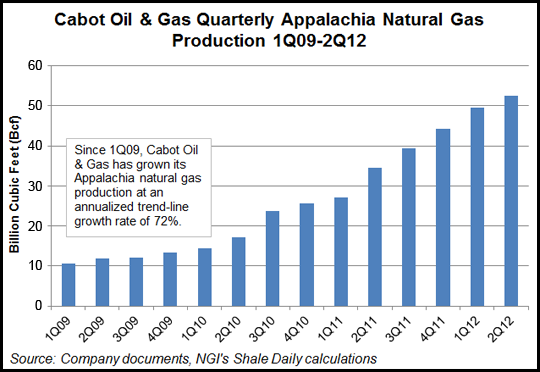NGI Archives | NGI All News Access
Cabot Given Green Light to Frack — Not Drill — in Dimock, PA
The Pennsylvania Department of Environmental Protection (DEP) has notified Cabot Oil & Gas Corp. that the company has satisfied the terms of a 2010 settlement and may resume hydraulic fracturing (fracking) and completion activities at seven Marcellus Shale natural gas wells in Dimock Township. However, the producer is still barred from drilling new wells in the area.

“They demonstrated the seven previously drilled wells in the affected area were in compliance with the law and had sufficient mechanical integrity, and so we were confident that they could resume production of those wells,” DEP spokesman Kevin Sunday told NGI’s Shale Daily on Wednesday. “But we did not authorize them to resume drilling new wells.”
The seven wells — A&M Hibbard 2H and 4, Ely 1H, Baker 3, Gesford 4R and 8H and Kelly 1H — are within a nine-square mile area of Dimock known as the Carter Road Area, in Susquehanna County.
Cabot spokesman George Stark told NGI’s Shale Daily that DEP’s “announcement confirms that these wells are in compliance with all applicable environmental laws. Cabot and the DEP have worked cooperatively to reach this result. This positive development is welcomed by the area landowners and our many community supporters. After taking all the appropriate steps, Cabot will proceed with our operations to add these wells to the high-producing, clean energy output of Susquehanna County.”
Jim Grimsley, a Cabot leaseholder whose 30 acres are in a gas production unit tied to the Kelly 1H well, said he was “glad to see that the whole thing is apparently coming to an end. They didn’t just give them the right to go ahead and start drilling again, but at least it’s a start,” he said of the DEP’s decision. “It’s been two and a half years and those wells have just been sitting there. I’m not going to kid you; I want my money like anybody wants money. But it’s caused a lot of other problems here in Dimock and hopefully it will all subside now.”
Methane migration problems were reported after a private water well exploded on Jan. 1, 2009 (see Daily GPI, Jan. 26, 2009). The DEP subsequently investigated and said Cabot was responsible for the contamination. Cabot settled with DEP in December 2010, with the company not accepting blame but agreeing to pay affected residents a total of $4.1 million and providing whole-house gas mitigation systems (see Shale Daily, Dec. 17, 2010).
At the time of the settlement, Cabot had hoped to resume operations at the seven wells in early 2011 and to resume drilling early last year. According to correspondence the DEP on May 9, 2011 asked Cabot to perform additional pressure tests at the Ely 1H and Kelly 1H wells to demonstrate that the wells were in compliance with the settlement. Cabot complied, conducting three such tests.
“These tests demonstrate that any gas present in the annuli of the wells is below the applicable regulatory pressure limits and is contained within the wellbore,” Scott Perry, deputy secretary for the DEP’s Office of Oil and Gas Management, said in a letter Tuesday to Cabot Vice President Phillip Stalnaker. ” As a result, DEP has determined that all seven drilled wells…are in compliance with all applicable environmental laws and the [settlement].”
Stalnaker had written Perry on Aug. 6 asking for permission to resume fracking and completion activities at the wells. In his response, Perry said those activities could resume on the condition that a 72-hour pressure test be performed on the Ely 1H and Kelly 1H wells.
“As the agreement provides, they need to demonstrate that the source of the methane that caused the impact on the aquifer has been eliminated or that the methane in aquifer goes back to background levels,” Sunday said. “We are still looking at some data from Cabot — which they are continuing to provide — and when we make a determination that the methane has been eliminated and returned to background levels, the agreement provides Cabot would be permitted to resume drilling. Any new drilling at this time has the potential to upset that analysis. Obviously there is some disturbance when you do any activity underground.”
Court documents revealed that most of the Dimock residents who filed a lawsuit against Cabot over the groundwater contamination have decided to settle with the company (see Shale Daily, Aug. 16). The settlement terms were not disclosed.
Several rounds of testing by the U.S. Environmental Protection Agency (EPA) determined that water from private wells in Dimock was safe to drink (see Shale Daily, July 26; April 10; March 19). Separate testing by the DEP arrived at the same conclusion (see Shale Daily, Jan. 23).
Grimsley, whose water was never contaminated and was not a party to the lawsuit, said it will take time for the community to heal. “We kind of have a bad name all over the place. You mention ‘Dimock’ and people think we’re a totally polluted area, and that’s not true. Hopefully maybe it will heal a few wounds. There are a lot of people who got very annoyed at each other — people who were neighbors, friends. It’s caused a lot of friction. I would hope within a short period of time a lot of that will go away. But I don’t think it’s all going to go away, not for a long, long time.”
Cabot’s natural gas production from Appalachia has exploded over the last few years. The company’s 10.7 Bcf produced during 1Q2009 has grown nearly five times to 52.4 Bcf during 2Q2012, according to company documents and NGI‘s Shale Daily calculations.
© 2024 Natural Gas Intelligence. All rights reserved.
ISSN © 2577-9877 | ISSN © 2158-8023 |

